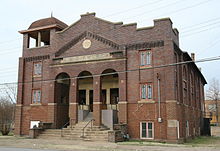Absalom Jones
Absalom Jones (1746 – February 13, 1818) was an
African-American abolitionist and
clergyman. After finding a black congregation in 1794, he was the
first African American ordained as a
priest in the
Episcopal Church of the United States, in 1804. He is listed on the
Episcopal calendar of saints and blessed under the date of his death, February 13, in the
1979 Book of Common Prayer as "Absalom Jones, Priest, 1818".
Early life
Jones was born into slavery in
Sussex County,
Delaware in 1746. When he was sixteen, he was sold to a storeowner in
Philadelphia, Pennsylvania. One of the store's clerks taught him to write. While still a slave of Mr. Wynkoop, he married Mary King (slave to S. King who was a neighbor to the Wynkoops), another slave, on January 4, 1770. Mr. Duché performed the wedding ceremony. By 1778 he had purchased his wife's freedom so that their children would be free, creating an appeal for donations and loans, and in another seven years he was able to purchase his own.
[1]
Ministerial career
Jones became a lay minister at the interracial congregation of
St. George's Methodist Church. Together with
Richard Allen, he was one of the first African Americans licensed to preach by the Methodist Church.
In 1772, while at St. George's Methodist Church, Absalom Jones and other black members were told that they could not join the rest of the congregation in seating and kneeling on the first floor and instead had to be segregated first sitting against the wall and then on the balcony, leading to the black members of the church getting up and walking out but not till they had completed their prayer.
[2] Absalom Jones and Richard Allen founded the
Free African Society (FAS), first conceived as a non-denominational mutual aid society, to help newly freed slaves in Philadelphia. Jones and Allen separated over their different directions in religion, but they remained lifelong friends and collaborators.
[3]
At the beginning of 1791, Jones started holding religious services at FAS. This became the core of his congregation for a new church. Wanting to establish a black congregation independent of white control, Jones in 1792 founded the congregation of the African Church in Philadelphia. It petitioned to become an
Episcopal parish. The church opened its doors on July 17, 1794, as the
African Episcopal Church of St. Thomas, the first black church in Philadelphia.
[3] Jones was ordained as a deacon in 1795 and as a priest in 1804, the first African-American
priest in the Episcopal Church.
[3] He was a well-known orator and helped establish the tradition of anti-slavery sermons on New Year's Day.
A month after the church opened, the Founders and Trustees published "The Causes and Motives for Establishing St. Thomas's African Church of Philadelphia," clearly stating their intent
"to arise out of the dust and shake ourselves, and throw off that servile fear, that the habit of oppression and bondage trained us up in."
[4]
It was rumored that Absalom possessed supernatural abilities to influence the minds of assembled congregations. White observers failed to recognize his oratory skills and believed rhetoric to be beyond the capabilities of black people. Numerous other African-American leaders were similarly implicated in supernatural activities due to these beliefs.
[4]
Fugitive Slave Act
After he was said to be the first slave to be a priest in the 19th century, Jones took part of the first group of African Americans to petition the
U.S. Congress. Their petition related to the 1793
Fugitive Slave Act which was criticized for encouraging cruelty and brutality, and noted the danger which free blacks risked of being kidnapped and sold into slavery. In this work he used moral suasion, Which was trying to convince whites that slavery was immoral, offensice to God, and contrar to the nation's deal.
[5] While
U.S. Representative George Thatcher of
Massachusetts responded with the desire to amend the Fugitive Slave Act, other representatives' resistance to changing the law forced his proposal to fail.
African Methodist Episcopal Church
On a parallel path, Allen founded the
African Methodist Episcopal Church (AME), the first independent black church within the Methodist tradition. He and his followers converted a building and opened on July 29, 1794 as
Bethel AME Church. In 1799, Allen was ordained as the first black minister in the Methodist Church by Bishop
Francis Asbury. In 1816, Allen gathered other black congregations in the region to create a new and fully independent denomination, the
African Methodist Episcopal Church. In 1816, he was elected the AME's first bishop.
Yellow Fever In Philadelphia
During the yellow fever plague in Philadelphia Richard Allen and Absalom Jones lead the way in helping people who were suffering from the plague. They helped nurse the sick and bury the dead a job that most people would not do for fear that they themselves might get sick. Jones displayed a work effort that surprise many people because he would sometime loss sleep and work all night to help the people out. Jones and Allen would also recruit many people would help the sick and many of these people were black, in the end there was almost twenty times more blacks people helping then whites.
[6]















